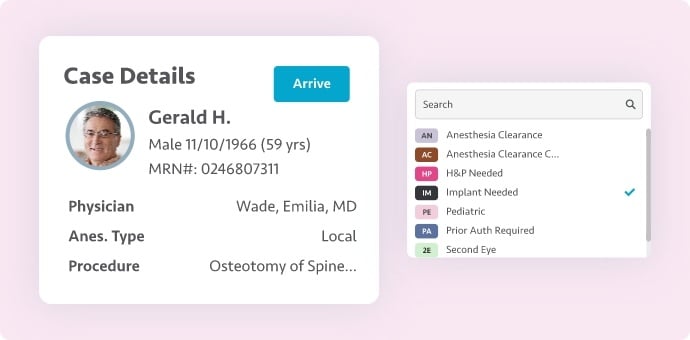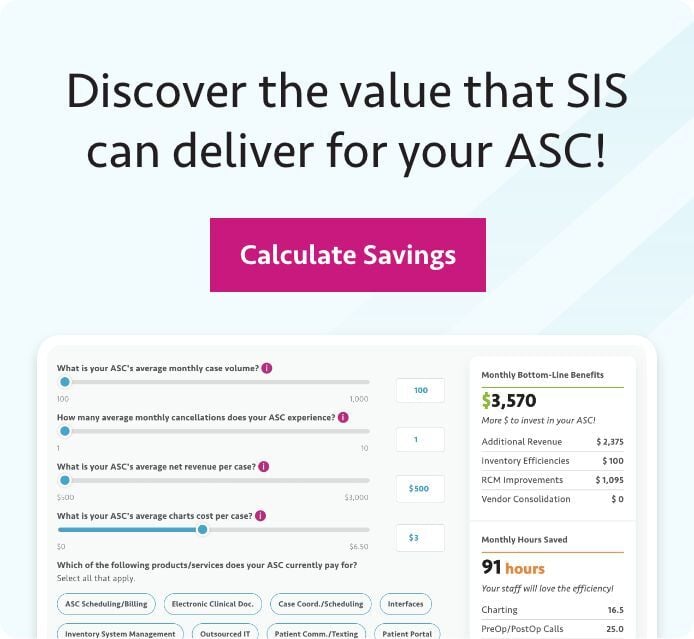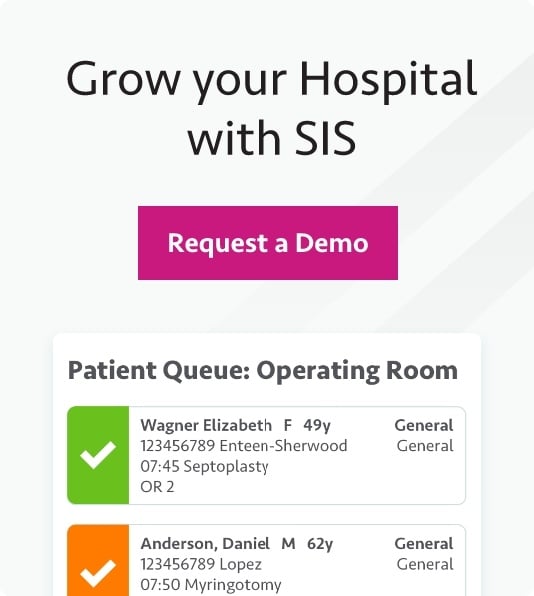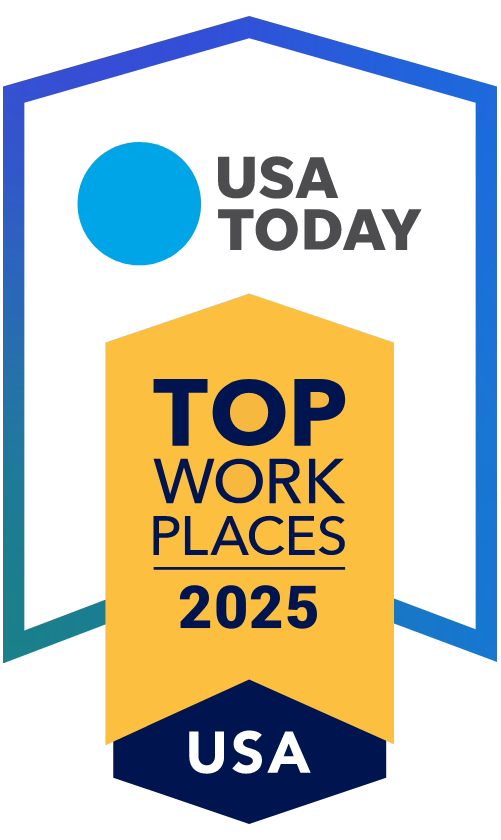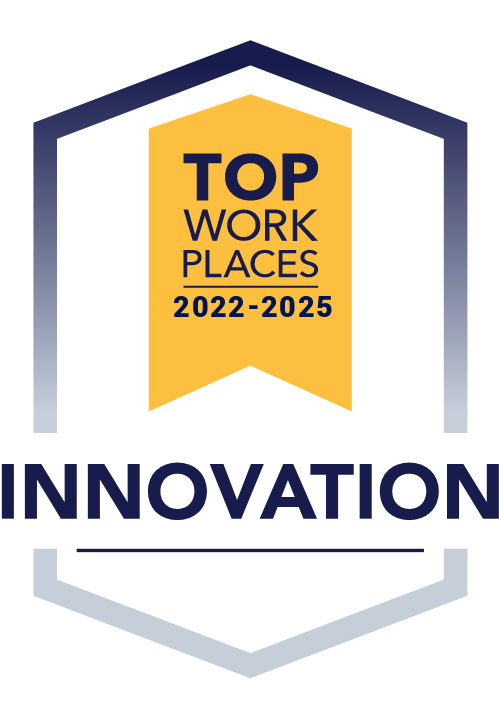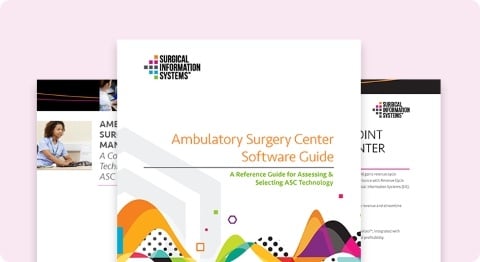SIS shares exciting news and engages with ASC leaders on the future of the industry at ASCA
ASCA is the premier event for the ambulatory surgery community, providing a vital platform to exchange knowledge and foster innovation in outpatient surgical care. As a platinum-level sponsor for ASCA’s 2025 conference, the Surgical Information Systems (SIS) team experienced incredible demand for their award-winning SIS Complete solution, their expanded Revenue Cycle Services (RCS) capabilities, and their easy-to-use transcription solution. ASCA attendees were also energized by SIS’s acquisition of ASC Logs, which allows SIS to offer electronic regulatory compliance software to ASCs.
The SIS team spent time engaging attendees to understand the unique needs and challenges they face in their ASCs. Our annual on-site survey gathers valuable insights directly from the community. This feedback plays a critical role in shaping our tailored solutions, ensuring they are designed to address your priorities and support your operational and clinical goals effectively.
This year, 70 ASCA attendees, including administrators, business office managers, and clinical managers, completed the survey. This article provides a detailed summary of the key insights shared during the conference.
ASCs Remain Optimistic About the Future
Confidence in the ambulatory surgery sector continues to grow. Nearly 90% of respondents rated the current outlook as "Optimistic" or "Very Optimistic." This sentiment aligns with data from ASCA 2024, which indicated ongoing momentum driven by rising procedure volumes, expanded access to outpatient care, and continued innovation in technology.
Key Challenges Impacting ASC Operations
When asked about the most pressing challenges, respondents identified several critical areas:
- Staffing and retention
- Reimbursement delays
- Increasing case volumes
- Upgrading technology infrastructure
These challenges emphasize the need for sustainable workforce strategies and advanced technology solutions to meet the demands of a rapidly growing industry. Without addressing these issues, businesses risk falling behind in terms of efficiency, productivity, and their ability to meet market demands. Adopting innovative solutions and investing in workforce development are essential to ensure long-term success and adaptability in this competitive landscape.
Revenue Cycle Management (RCM) as a Strategic Priority
The complexity of managing revenue cycles remains a top focus for many ASCs. Over one-third of respondents reported outsourcing part of their RCM functions, with coding and coding audits being the most outsourced tasks.
Nearly 50% of surveyed ASCs are managing all RCM functions in-house, emphasizing the critical importance of providing internal teams with advanced tools that streamline workflows, reduce administrative burden, and enhance financial outcomes. For ASCs whose revenue cycles are adversely affected by staffing and retention as highlighted previously, outsourcing their revenue cycle may be a viable option.
Technology Adoption Accelerates in ASCs
The adoption of advanced technology solutions continues to play a pivotal role in optimizing ASC operations. Respondents are most focused on evaluating or implementing three key solutions:
- Electronic Health Records (EHR)
- Practice management systems (including scheduling and RCM)
- Analytics platforms
In addition, there is increased adoption of tools such as electronic compliance logs and credential tracking systems, reflecting a growing emphasis on operational efficiency and regulatory compliance.
Future Trends in ASC Automation
Survey respondents provided valuable perspectives on the future of automation in ASC operations:
- 93% agreed that delaying automation will make it harder for ASCs to address growing case volumes and increasing complexity.
- 95% emphasized the importance of expert support to manage the complexities of coding and billing.
- 90% identified regulatory compliance workflows—such as logs, credentialing, and learning management—as a key focus for the next wave of automation.
These findings affirm the critical role of automation in driving efficiency, compliance, and scalability in ASC operations.
Supporting ASCs and the Environment
ASCs who are still using paper processes for charting, compliance management, and credential tracking are not only bogged down by manual processes, but their reliance on paper can be detrimental to the environment. SIS encourages care providers to adopt electronic solutions to enhance the operations at their center and reduce their environmental impact.
At this year’s ASCA conference, SIS also announced their partnership with the National Forest Foundation, an organization that leads forest conservation efforts and promotes responsible recreation across the U.S. SIS encouraged conference attendees to help them reach that goal. SIS committed to plant one tree for attendees who:
- Visited the SIS booth
- Attended SIS’ ASC celebration
- Completed the ASC Survey
- Scheduled a meeting or SIS Complete demo with the SIS team
Through the NFF’s Sapling Program, SIS will be planting 1,500 trees to help support cleaner air, resilient forests, and thriving wildlife habitats.
Looking Ahead
We extend our sincere gratitude to everyone who engaged with us at ASCA 2025. Your insights are instrumental in shaping the solutions we create to meet the evolving needs of the ASC community.
If we missed the opportunity to connect, or if you would like to continue the conversation, please visit us at www.sisfirst.com. We look forward to partnering with you and seeing you again next year.




